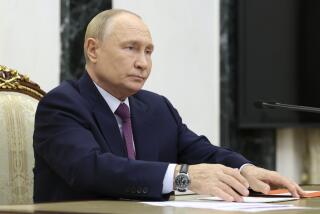Missile Defense Would Rile the Russian Bear
- Share via
Although no Russian leader is banging his shoe on a table in protest, the American quest for a national missile defense system threatens Russia’s national defense reforms. Having no desire for a renewed arms race, President Vladimir V. Putin has moved to enlist European opposition to America’s plans.
Ten years after communism’s end, Russia’s defenses and defense strategy are finally being refashioned to meet the needs of the post-Cold War world. Big cuts are coming in military manpower and conventional weapon stockpiles. A restructuring of the armed forces, including the strategic missile forces, is planned. All this comes in the wake of a key change in doctrine: Forty years after President Eisenhower’s recognition that nuclear weapons are cheaper than large standing armies, Russia yet again has chosen to rely more strongly on nuclear deterrence for its defense.
Arriving at a remake of the old ruling military doctrine was not easy, which is one reason why Putin does not want to put it at risk. Since 1991, all attempts at military reform in Russia have been preceded by struggles among various military service chiefs. These struggles are animated not only by rivalry and personal ambition but the government’s lack of funds. Indeed, a huge part of Russia’s military budget is spent on basic needs (really the survival) of military personnel.
The tragic sinking of the submarine Kursk last August compelled Putin to act on reforms. In the wake of the drownings on the Kursk and the ongoing Chechen war, the Army’s autumn efforts at conscription saw thousands of boys go into hiding to avoid the military service. Politicians, sensing the public mood, began to demand speedy transition to a professional army. But a professional army is expensive. Putin knows that efforts to keep Russia’s nuclear deterrent credible in the face of NMD will drain resources needed to professionalize the army.
Military reform is arriving now because, for the first time since Boris N. Yeltsin became president, political authority in Russia is stable, relatively united and--most important--self-confident. In the past, the foundation of Russian military doctrines was to ensure military readiness--with massive ground troops--for a great war. But Russians no longer support such a stance. Polls conducted during the Kosovo war, the second Chechen campaign and during the Kursk tragedy show that Russians primarily are concerned with everyday problems, including the conscription of their children.
Under these circumstances, it would not be particularly difficult for Putin to convince ordinary Russians of the need to be on friendly terms with the West, and thus cut the size of the army. Winning over generals and political hawks would be more difficult, and it is with them that NMD stirs up trouble.
But even with the hawks on board, genuine military reform is impossible without effective civil control. That would require transparent budgets, strong and independent legislative power and a clear decision-making process with well-defined responsibilities. This is both simple and incredibly difficult. But without genuine reform, Russia will remain in a kind of permanent transition, its democratic revolution incomplete.
Although the Kremlin’s current political course is open to interpretation, Russia’s leaders have unambiguously declared their European (read pro-Western) intentions. The most difficult task for the Kremlin now is to overcome the West’s sense of weariness toward Russia, built up over the last 10 years.
To convince the West of its sincerity, Russia must avoid resorting to hackneyed Bolshevik-style nuclear threats. New interests and mechanisms of cooperation are needed. Russia needs the West to be engaged in its security. It must, while it is still possible, try to intensify military-political cooperation.
The world, and Russia’s place in the world, have undergone a revolution since 1990. Russia’s military and its leaders have mostly sat on the side, watching and worrying. They are now finally changing the military’s doctrines, its orientation and its vision of the world. NMD would make moving forward that much harder.
More to Read
Sign up for Essential California
The most important California stories and recommendations in your inbox every morning.
You may occasionally receive promotional content from the Los Angeles Times.













